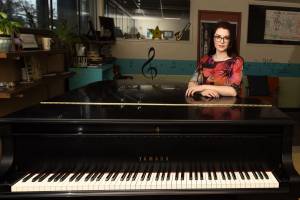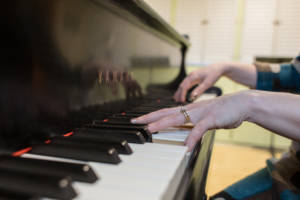The studio is currently full and no longer accepting new students. Please check back at another time.
~ Sara
Voice Lessons
 Ready to get into that high school musical? Trying out for a solo or prepping for District choir? Perhaps you’re a seasoned singer, but find yourself struggling with some recent vocal changes, or you’re ready to up your performance game.
Ready to get into that high school musical? Trying out for a solo or prepping for District choir? Perhaps you’re a seasoned singer, but find yourself struggling with some recent vocal changes, or you’re ready to up your performance game.
If so… you’ve found the right place.
I teach a wide variety of genres including musical theatre, jazz, contemporary, classical, opera, and pop/rock. All lessons will focus on developing proper breathing, resonance, and tone production, in addition to performance style and interpretation.
As a teacher, I’m a sucker for all things musical theatre, and as such, most students should expect a steady assault of MT rep. (Because it’s fun for acting!) My background as a “classical” singer gave me a great technical foundation and a love of 20th century art song. A steady diet of continuing education with CCM (contemporary and commercial music styles) has opened my eyes to a whole new world of technical possibilities.
On music experience: It is best if students are able to read music or have experience playing another instrument, preferably piano. But it’s not a deal breaker if you can’t. (I can teach you, if you’d like!)
- The Who and What: Voice lessons are available for ages 12 and older. Students should have access to an acoustic piano or small keyboard for practice purposes, or be prepared to invest $9 a month into an accompaniment app. Lessons occur once a week, every week. Drop-ins are available during daytime hours.
- Suggested Materials: Voice students must bring a 3-ring binder, current music repertoire, and a bottle of water to each lesson. Recording devices, such as iDevices, smart phones, small audio recorders, or USB flash drives are strongly recommended.
- Practice Expectations: Voice students are expected to practice enough to reach their lesson goals each week. Practice should focus on both vocalises and repertoire; voice students must memorize their repertoire. (This is how we get to the good stuff!)
Piano Lessons
 Brand new to piano lessons? Maybe your child had lessons before, but they felt too “cookie cutter” and didn’t ignite a passion for music. (Hey, that happened to me once too.)
Brand new to piano lessons? Maybe your child had lessons before, but they felt too “cookie cutter” and didn’t ignite a passion for music. (Hey, that happened to me once too.)
I teach a variety of piano students, and they all have one thing in common: They love to create music. My teaching style centers around keeping that love of music front and center in our studies. What does that mean? I don’t do exams. I don’t do festivals. And I try to avoid high stakes performances that cause meltdowns.
I DO encourage my students to learn music theory so that they can write their own music and improvise on their favorite radio songs. I DO teach “the classics” like Für Elise, The Entertainer, and Clair de Lune. I DO provide performance opportunities that allow students to celebrate and show off the skills they’ve learned. And… I use tons of gamification to reinforce learning and make lessons… well, fun. (Because if it’s not fun? Don’t do it.)
So whether you’re 7 years old or 47 years old, if you’re looking for a teacher who will help nurture your love for music, this could be the studio for you.
Piano students will explore a variety of genres including classical, popular, jazz and blues, and improvisation. . We focus on establishing healthy technique so that you can enjoy playing for years to come.
- The Who and What: Piano lessons are available for beginner through early advanced, beginning age 7 and older. Lessons occur once a week, every week.
- Required Materials: Must have access to a fully functional and well-tuned piano or full-sized weighted keyboard or digital piano for daily practice. Students should bring their music method books and repertoire to each lesson. Additional materials (piano book bag, metronomes, music, flash cards) may also be recommended.
- Practice Expectations: A student’s progress is determined by dedicated practice, not by simply attending lessons. Ideally, students should practice at least 4-5 days a week. Specific amounts of practice time are not assigned to each student. Instead, students should practice long enough to hit the targets that we create during each lesson.


